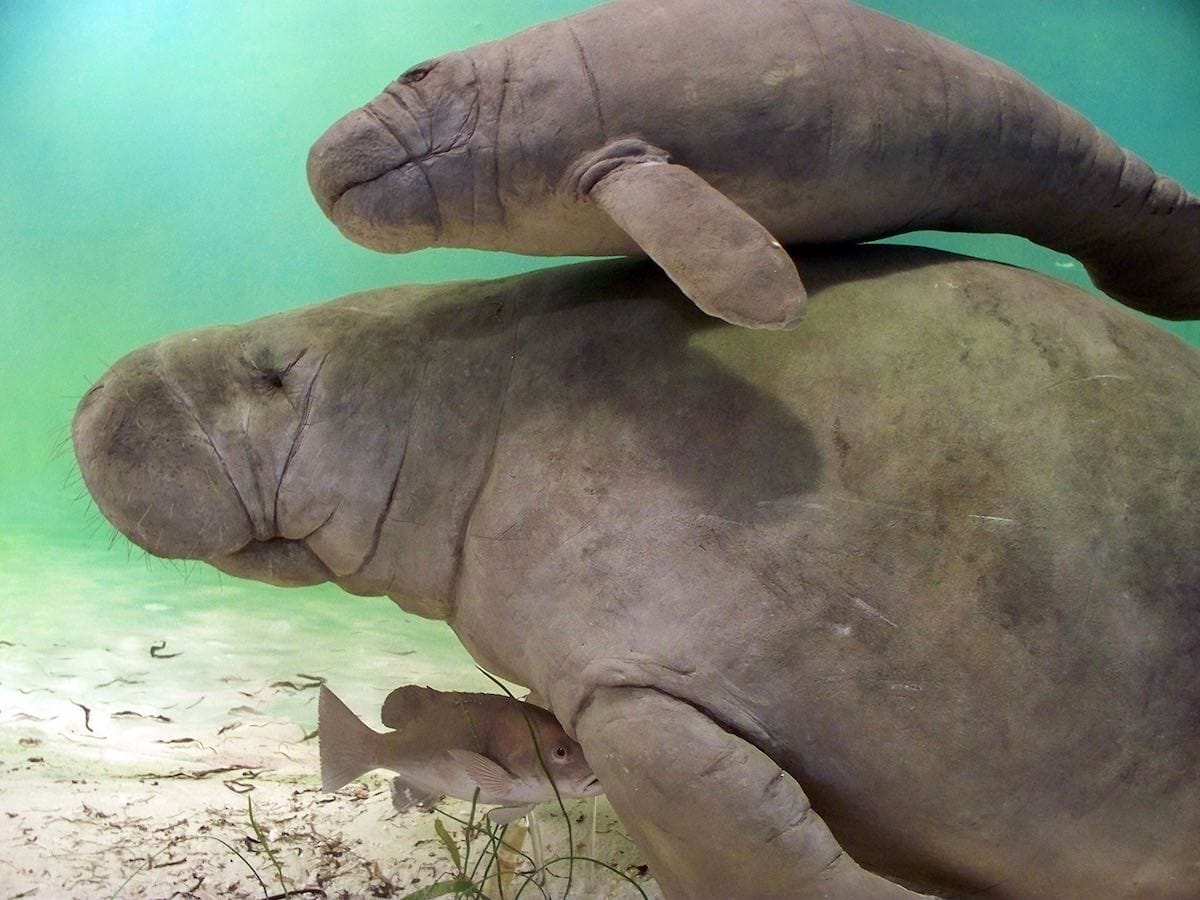Manatees, with their gentle nature and slow, graceful movements, have captured the hearts of many. It’s easy to see why some people might be tempted to reach out and touch these “gentle giants.” However, as tempting as it may be, petting or touching a manatee is illegal and potentially harmful to these vulnerable creatures. This article delves into the reasons behind these protective measures and explains how we can admire these fascinating animals responsibly.
## Why Touching Manatees is a Big No-No
You see, manatees are protected by a trifecta of legal safeguards: the Marine Mammal Protection Act, the Endangered Species Act, and Florida’s Manatee Sanctuary Act. These laws collaborate to form a safety net for manatees, preventing harassment and safeguarding their well-being. But why is petting considered harmful, even if done gently?
Petting manatees, even with the best intentions, can disrupt their natural behaviors and have unintended consequences. Here’s why:
1. **Space is Crucial for Manatee Safety:** When humans approach, manatees might react by moving into dangerous areas, such as busy boating lanes, increasing the risk of collisions with vessels.
2. **Too Much Friendliness Can Be Detrimental:** Feeding or approaching manatees can lead to habituation—a dangerous situation where they become accustomed to human interaction and lose their natural wariness. This can lead them to approach boats looking for handouts, increasing their vulnerability to boat strikes.
3. **Sensitive Skin Requires Special Consideration:** Manatees possess delicate skin that can be easily irritated or injured, even by a seemingly gentle touch. Even a small scratch can become infected, jeopardizing their health.
So, how can we admire these peaceful giants without putting them at risk? The answer lies in observation from a distance. When you encounter a manatee in the wild, respect their space and allow them to swim, eat, and live undisturbed. By appreciating their presence from afar, we contribute to their well-being and ensure their continued survival for future generations.
## Will a Manatee Hurt You? Unraveling the Truth
While manatees have a well-earned reputation for being gentle and peaceful, they are still wild animals with their own set of instincts. It’s essential to remember that even accidental interactions with these massive creatures can have unintended consequences.
Weighing in at thousands of pounds, a manatee’s sheer size and power mean that even an accidental bump from these slow-moving herbivores can cause harm. Consider this: you probably wouldn’t try to hug a bulldozer, right? Just like a bulldozer, manatees are simply focused on their daily routines and may not be aware of smaller beings around them.
Moreover, getting too close might startle or stress a manatee, potentially leading to defensive reactions that could result in accidental injuries. Just imagine someone invading your personal space while you’re enjoying a meal—you might get a little uncomfortable too!
That’s why it’s paramount to admire these gentle giants from a safe distance. Not only is it the law (and violating these laws carries hefty penalties), but it’s also the most effective way to ensure everyone’s safety. Respect their boundaries, admire them from afar, and let them go about their day undisturbed.
## What Happens if I Hug a Manatee? The Legal and Ethical Implications
The urge to hug a manatee might be strong, especially given their often-used nickname, “sea cows,” but succumbing to this desire is a recipe for trouble. Here’s why:
### Legal Ramifications: Protecting Endangered Species
Hugging or touching a manatee violates multiple federal and state laws designed to safeguard these endangered creatures. The Marine Mammal Protection Act and the Endangered Species Act, enacted at the federal level, provide comprehensive protection for all marine mammals, including manatees. In Florida, the Florida Manatee Sanctuary Act adds another layer of protection, explicitly prohibiting any form of disturbance to these animals in state waters. These laws carry serious consequences, including significant fines and even potential jail time for violators.
### Ethical Considerations: Respecting Wildlife Boundaries
Beyond the legal repercussions, hugging a manatee is inherently wrong. These magnificent animals are not here for our amusement or entertainment; they are wild creatures deserving of our respect and space to live undisturbed lives.
Forcing physical contact on a manatee, even with good intentions, can be a terrifying experience for them. As sensitive creatures, manatees rely on their natural instincts and routines to survive. Disrupting these routines through unwelcome physical contact can cause stress, leading to behavioral changes that make them vulnerable to dangers like boat strikes.
### Health Implications: Protecting Delicate Skin
Manatees have surprisingly delicate skin that is prone to irritation and infections. Coming into direct contact with human skin, sunscreen, or other substances can cause skin problems and make them more susceptible to diseases.
The best way to appreciate manatees is to observe them from a distance, allowing them to go about their day undisturbed. Your restraint, while seeming small, contributes significantly to protecting these amazing creatures.
## Can You Cuddle a Manatee? Debunking the Myth
The idea of cuddling a manatee might seem appealing, conjuring images of snuggling up to these gentle giants. However, the reality is far different. Here’s why cuddling a manatee is not only impossible but also dangerous and illegal:
### The Law is Clear: No Touching Allowed
The United States has strict laws in place to protect manatees, and these laws explicitly prohibit touching, hugging, or any other form of physical contact. The Marine Mammal Protection Act, the Endangered Species Act, and the Florida Manatee Sanctuary Act all work in concert to safeguard these vulnerable creatures. Violating these laws can result in severe consequences, including hefty fines and even jail time.
### Respecting Boundaries: Key to Coexistence
As much as we might be tempted to get close, it’s crucial to recognize that manatees are wild animals with their own space requirements and social structures. Approaching them too closely, even for a seemingly harmless cuddle, disrupts their natural routines and can cause significant stress, potentially leading to long-term behavioral changes.
### Manatees are Not Pets: Understanding the Risks
Manatees are powerful animals, and even unintentional contact can result in injuries. Their size and strength mean that a playful nudge or an attempt to move away from an unwanted advance could inadvertently harm a person nearby.
### Ethical Observation: The Best Approach
While cuddling manatees remains firmly off-limits, there are many ways to enjoy these remarkable creatures ethically and safely:
* **Observing from a Distance:** One of the most rewarding ways to experience manatees is by observing them in their natural habitat—from a respectful distance.
* **Supporting Responsible Tourism:** Choosing ethical tour operators that prioritize manatee safety and conservation ensures a positive experience for both you and these gentle giants.
* **Advocating for Conservation:** Supporting organizations dedicated to manatee conservation efforts is crucial for their long-term survival.
By understanding the reasons behind these protective measures and appreciating manatees from afar, we contribute to the preservation of these magnificent creatures for generations to come.
Have you ever wondered why the axolotl is endangered? Its fascinating history and delicate ecosystem face challenges that could lead to its extinction. [Learn More](https://www.lolaapp.com/why-the-axolotl-is-endangered)
We all love it when our cats knead us, but do you really know what it means? Discover the fascinating reasons behind this adorable behavior and how it strengthens the bond between you and your feline friend. [Explore Now](https://www.lolaapp.com/what-does-it-mean-when-a-cat-kneads)

















2 thoughts on “Why It’s Illegal and Harmful to Touch Manatees: Understanding the Law and the Dangers”
Comments are closed.